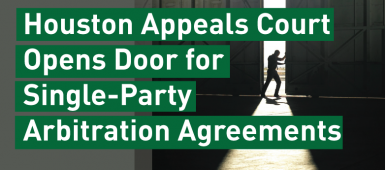
- Mediation
- Arbitration
- Court Neutrals
- Online Dispute Resolution
- Technology
- Court Decisions
- More
- Legislation
- Healthcare
- Guest Posts
- John DeGroote
- John C. Fleming
- Rick Freeman
- Professor Peter Friedman
- Honorable W. Royal Furgeson, Jr.
- James M. Gaitis
- Laura A. Kaster
- Professor John Lande
- Philip J. Loree, Jr.
- Michael McIlwrath
- F. Peter Phillips
- Professor Alan Scott Rau
- Professor Thomas J. Stipanowich
- Professor S.I. Strong
- Richard Webb
- Glen M. Wilkerson
- International arbitration
- Regulation
- Sports and Entertainment
- We’re Back!!!!Well, it’s been a while since we published and that is about to change. Since I spent much of last year becoming
 JAMS Welcomes Karl Bayer to its Panel of NeutralsJAMS, the world’s largest private alternative dispute resolution (ADR) provider, is pleased to announce that Karl Bayer
JAMS Welcomes Karl Bayer to its Panel of NeutralsJAMS, the world’s largest private alternative dispute resolution (ADR) provider, is pleased to announce that Karl Bayer Class Action Waivers in Arbitration Agreements: The Twenty-First Century Arbitration Battleground and Implications for the EU CountriesLinda S. Mullenix, Morris & Rita Atlas Chair in Advocacy at the University of Texas School of Law, has written “Class Ac
Class Action Waivers in Arbitration Agreements: The Twenty-First Century Arbitration Battleground and Implications for the EU CountriesLinda S. Mullenix, Morris & Rita Atlas Chair in Advocacy at the University of Texas School of Law, has written “Class Ac Picking the Proper Technological Tool for Problem-Solving in ArbitrationProfessor Amy J. Schmitz, John Deaver Drinko-Baker & Hostetler Chair in Law and Co-Director of the Translational Data An
Picking the Proper Technological Tool for Problem-Solving in ArbitrationProfessor Amy J. Schmitz, John Deaver Drinko-Baker & Hostetler Chair in Law and Co-Director of the Translational Data An
Recent Posts
Texas Company Files Suit to Recover Bonus from Armstrong
A Texas promotions company that paid cycling champion Lance Armstrong bonus payments following his seven Tour de France wins has filed a breach of contract lawsuit in a Dallas district court against the now disgraced sports star. SCA promotions is seeking to recover more than $12 million the company paid to Armstrong in connection with several cycling wins. This case is especially interesting because SCA and Armstrong previously engaged in arbitral proceedings after the company refused to pay the cyclist a bonus for his 2004 win due to purported doping allegations. Following arbitration, SCA reportedly paid the cyclist a bonus and $7.5 million in attorney fees. SCA Chief Executive Officer Bob Hamman said in light of Armstrong’s recent doping admission, the payments were unearned and improper. He also stated the promotion company’s position is supported by USADA sanctions imposed against Armstrong last summer that include “forfeiture of any medals, titles, winnings, finishes, points and prizes.” A spokesperson for Armstrong disagrees. He claims the case may not be reopened because the parties’ 2006 settlement includes a provision that states, “No party may challenge, appeal or attempt to set aside the arbitration award.” Stay tuned to Disputing for updates regarding this lawsuit. You can also read more about the case on NPR.
Continue reading...Fifth Circuit Refuses to Confirm Foreign Arbitral Award Due to Lack of Jurisdiction
In a case of first impression, the United States Fifth Circuit Court of Appeals affirmed a district court’s refusal to confirm a foreign arbitral award due to lack of personal jurisdiction. In First Investment Corporation of the Marshall Islands v. Fujian Mawei Shipbuilding, Limited, No. 12-30377 (5th Cir. revised Jan. 17, 2013), First Investment Corporation of the Marshall Islands (“First Investment”) entered into a series of contracts to purchase new ships from Chinese state-owned Fujian Shipbuilding Industry Group Corporation (“FSIG”) and Fujian Mawei Shipbuilding Limited, a private company that is owned in large part by FSIG (collectively, the “Fujian Companies”). According to First investment, the Fujian Companies breached the parties’ shipbuilding agreement by refusing to honor an option contract. As a result of the alleged breach, First Investment invoked an arbitration clause in the parties’ contract and an arbitration panel was formed in London under the rules of the London Maritime Arbitration Association. A three-member arbitral panel decided in favor of First Investment. One of the arbitrators, however, was unable to sign the award because he was detained by the Chinese government before a final draft was completed. His draft dissenting opinion was attached to a final arbitral award of $26 million. After the arbitral award was issued, First Investment attempted to confirm it in China under to the United Nations Convention on the Recognition and Enforcement of Foreign Arbitral Awards. The Chinese court reportedly refused to confirm the $26 million award pursuant to Article V of the New York Convention because the detained arbitrator never reviewed the final draft. About one year later, First Investment sought to confirm the arbitral award against both the Fujian Companies and the People’s Republic of China in the United States District Court for the Eastern District of Louisiana. Although the court issued a default judgment in favor of First Investment, it was later vacated as a result of improper service. The Louisiana court then granted the Fujian Companies’ motion to dismiss the case for lack of personal jurisdiction. The court also dismissed First Investment’s petition against China for lack of subject matter jurisdiction. First Investment then appealed to the Fifth Circuit. According to the appeals court: …First Investment argues that the Fujian Entities, as foreign entities with no contacts in the United States, were not entitled to the protections of the Fifth Amendment’s Due Process Clause. First Investment further asserts that personal jurisdiction is not a valid defense under the New York Convention. Finally, First Investment argues that because the Fujian Entities were alter egos of the PRC, a foreign state over which personal jurisdiction was not required, the district court was wrong to dismiss the Fujian Entities. As to the first argument, the Fifth Circuit stated there is no case law to support First Investment’s contention that foreign entities without property in the United States are not entitled to due process protections. Instead, the court held, …[T]here is no basis to conclude that a party’s status as a foreign entity permits a court to ignore personal jurisdiction or exercise such jurisdiction without first establishing sufficient contacts between the defendant and the forum state. Next, the appellate court addressed First Investment’s claim that lack of personal jurisdiction is not one of the grounds on which confirmation of an arbitral award may be denied under the New York Convention. The court stated, Even though the New York Convention does not list personal jurisdiction as a ground for denying enforcement, the Due Process Clause requires that a court dismiss an action, on motion, over which it has no personal jurisdiction. See Pervasive Software, Inc., 688 F.3d at 220-21. Because the New York Convention, through its implementing legislation, is an exercise of presidential and congressional power, whereas personal jurisdiction is grounded in constitutional due process concerns, there can be no question that the Constitution takes precedence. The Fifth Circuit continued, Regardless of Congress’s intent in failing explicitly to include a personal jurisdiction requirement, a court is not thereby relieved of its responsibility to enforce those constitutional protections that guard a party from appearing in a forum with which it has no contacts. Finally, the appeals court dismissed First Investment’s argument that the Fujian Companies are merely alter egos for the People’s Republic of China by stating the company failed to meet the accepted “standard for establishing an alter ego relationship.” Because there was no basis to establish personal jurisdiction over the Fujian Companies or subject matter jurisdiction over the People’s Republic of China, the United States Fifth Circuit Court of Appeals affirmed the district court’s decision to dismiss the case.
Continue reading...Fifth Circuit Affirms Arbitration Decision on Collective Bargaining Agreement
In January, the United States Fifth Circuit Court of Appeals upheld an arbitrator’s decision in a case that arose pursuant to a collective bargaining agreement. In Albemarle Corporation v. United Steel Workers AOWU Local 103, No. 11-31185 (5th Cir. Jan. 3, 2013), two Albemarle Corporation (“Albemarle“) employees were terminated for alleged safety violations. Their union, United Steel Workers (“USW”), represented the men in arbitration under the parties’ collective bargaining agreement (“CBA”). After an arbitrator ruled that the two men should be reinstated following a 14-month unpaid suspension, Albemarle sought judicial review of the arbitrator’s decision. In the case, Albemarle claimed the arbitrator exceeded his authority and his decision violated public policy. A district court granted Albemarle’s motion for summary judgment and vacated the arbitrator’s decision. USW then appealed the case to the Fifth Circuit. The Circuit Court stated judicial review of an arbitral decision that arises from a CBA is narrowly limited. According to the Fifth Circuit, so long as an arbitrator has arguably construed the parties’ agreement and acted within the scope of his authority his decision may not be overturned even if a court believes he committed serious error. Because there was no language in the CBA that required an employee be terminated as a result of a safety violation, the Appeals Court held the arbitrator’s reading of the contract was within the bounds of his authority. Next, Albemarle maintained that the arbitrator’s decision to reinstate the employees violated public policy. The Circuit Court stated that although a collective bargaining agreement may be unenforceable on such grounds, the “public policy must be explicit, well defined, and dominant.” The Fifth Circuit continued, In the present case, the Grievants made a serious error in the manner they reported the spill for which they are being strictly disciplined. However, the arbitrator at the same time found that the Grievants had no prior record of safety violations; that a gasket failure, and apparently not the Grievants, was responsible for causing the leak; that the Grievants reported the incident within five minutes to a security guard who quickly reached a supervisor; and that the spill was not cause for issuing emergency notifications. In light of the factual record, Albemarle does not articulate how the CBA, if read by the arbitrator to permit reinstating the Grievants after sanctioning them fourteen months lost wages, violates public policy. We find the public policy exception does not apply. Because the arbitrator’s decision was within the bounds of his authority under the parties’ CBA and did not violate public policy, the Fifth Circuit reversed the district court’s decision and upheld the arbitral award.
Continue reading...Texas Legislative Roundup, February 12, 2013
The following bills relating to alternative dispute resolution were introduced during the 83rd Texas legislative session. The last day of the regular session will be Monday, May 27, 2013. Click on the bill number to read its text and on the status link to find the bill’s legislative history. Senate Bills: SB 355 relates “to the powers and duties of the Title IV-D agency regarding the establishment, collection, and enforcement of child support and in connection with an application for a marriage license or protective order; providing an administrative fine.” Bill status. SB 296 relates “to the waiver of sovereign immunity for certain claims arising under written contracts with state agencies.” Bill status. House Bills: HB 33 relates “to alternative methods of dispute resolution in certain disputes between the Department of Aging and Disability Services and an assisted living facility licensed by the department.” Bill status. HB 167 relates “to the establishment, operation, and funding of victim-offender mediation programs.” Bill status. HB 399 relates “to the confidentiality of certain communications involving an ombudsman program established by an employer as an alternative dispute resolution service.” Bill status. HB 585 relates “to procedural requirements under the Property Tax Code.” Bill status. HB 586 relates “to the waiver of sovereign immunity for certain claims arising under written contracts with state agencies.” Bill status. HB 837 relates “to credit to certain ceding insurers for reinsurance ceded to certain certified assuming insurers.” Bill status. HB 899 relates “to certain rights of victims, guardians of victims, and close relatives of deceased victims in the criminal justice system.” Bill status. HB 937 relates “to establishing a restorative justice pilot program for juvenile offenders in certain counties.” Bill status. HB 1031 relates “to the confidentiality of certain communications involving an ombudsman program established by an employer as an alternative dispute resolution service.” Bill status. HB 1065 relates “to the right of an employee who is a victim of a crime to time off from work to attend court proceedings related to that crime.” Bill status. The deadline for filing new bills or joint resolutions is Friday, March 8th. Please stay tuned to Disputing for more Texas legislative updates!
Continue reading...Arbitration
Houston’s 14th District Appeals Court has reversed a district court’s order denying a company’s motion to compel arbitration. In Cotton Commercial USA, Inc. v. Clear Creek Independent School Dist. (Tex.App.–Houston [14 Dist.], 2012), the Clear Creek Independent School District (“School District”) contracted with Cotton Commercial USA, LP (“Contractor”) for debris removal following Hurricane Ike. A restoration services agreement signed by the parties contained an agreement to arbitrate any disputes related to work performed as part of the contract. In addition, the agreement specifically authorized the use of subcontractors to complete the work and provided for a 20 percent mark-up where a subcontractor was used. In September 2008, the hurricane debris was reportedly removed by Cottonwood Debris Company, LLC (“Subcontractor”). After Contractor submitted bills that included a mark-up for Subcontractor’s services, the School District questioned the relationship of the two parties and refused to pay the mark-up rate. The School District also alleged that Subcontractor submitted a number of fraudulent invoices for work that was never performed. Contractor and Subcontractor were later merged to form Cotton Commercial USA, Inc. (“Cotton Commercial”). In December 2010, the School District filed a lawsuit against Cotton Commercial alleging fraud. In May 2011, Cotton Commercial filed a motion to stay court proceedings and compel the dispute to arbitration. The company also asserted a number of counterclaims against the School District. The district court denied Cotton Commercial’s motion to compel arbitration with regard to the School District’s claims against the company and granted Cotton Commercial’s motion related to the company’s counterclaims. Cotton Commercial then appealed the trial court’s order denying the company’s motion to compel the parties to arbitration over the School District’s claims. The School District did not appeal either of the lower court’s orders. On appeal, the School District argued that it filed a lawsuit against Cotton Commercial because Subcontractor was merged with the company and ceased to exist. In addition, the School District stated it should not be compelled to arbitrate because there was no contract between the two parties. According to Houston’s 14th District, although an agreement to arbitrate is generally only enforced between signatories, exceptions do exist. Despite that a corporate relationship between Cotton Commercial, Contractor, and Subcontractor “is insufficient to compel arbitration,” the court stated, …the Texas Supreme Court recognizes an “intertwined-claims” test that has been applied by other courts in circumstances where a nonsignatory defendant has a “close relationship” with one of the signatories and the claims are “‘intimately founded in and intertwined with the underlying contract obligations.’” After finding the School District’s claims were “completely interwoven” with the parties’ restoration services agreement, the appeals court said, The School District is a signatory to the Restoration Agreement. The School District agreed to arbitrate “any controversy, dispute or claim arising out of [the Restoration Agreement] or the Work done [thereunder].” The School District cannot artfully choose its defendant or plead its claims to avoid arbitration. In addition, the court dismissed the School District’s public policy argument by stating, It would be contrary to Texas policy favoring arbitration and against artful pleading to avoid arbitration to allow the School District to avoid its agreement to arbitrate claims or to piecemeal such claims in two forums simply because its contracting counterpart has merged with another company. Next, the appellate court addressed the scope of the parties’ agreement to arbitrate. According to the court, the arbitration agreement at issue was extremely broad and the factual allegations in the complaint were sufficient to prove the dispute fell within the scope of the agreement. Finally, Houston’s 14th District Appeals Court reversed the district court’s order denying Cotton Commercial’s motion to compel arbitration with regard to the School District’s claims against the company and remanded the case.
Continue reading...Mediation
Healthcare Disputes
Legal Research
About Disputing
Disputing is published by Karl Bayer, a dispute resolution expert based in Austin, Texas. Articles published on Disputing aim to provide original insight and commentary around issues related to arbitration, mediation and the alternative dispute resolution industry.
To learn more about Karl and his team, or to schedule a mediation or arbitration with Karl’s live scheduling calendar, visit www.karlbayer.com.










